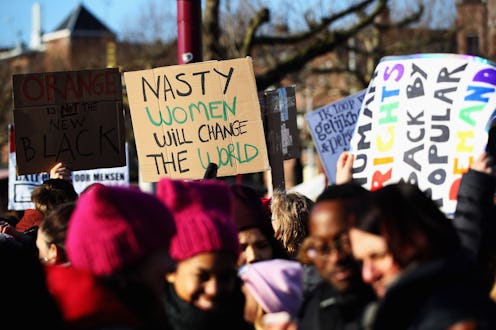
One of the first rules we learn when we're growing up is to be "nice." But like most rules, this is an overgeneralization, because there are certain times when you don't have to be "nice" — and, indeed, shouldn't. Women especially are taught to be nice to others at the expense of being nice to themselves, and that leads us to miss out on opportunities and tire ourselves out. That's why it's so important to give ourselves permission to break this rule when necessary.
Challenging the imperative to be nice is a feminist act because "niceness" is so frequently gendered. Girls are "supposed" to be made of "sugar, spice, and everything nice." This means we're expected to smile all the time, help others without anything in return, and avoid making people angry or being "nasty women." Since those aren't really the qualities of a leader, being too nice can hold us back in our careers while men grasp opportunities for themselves because they're OK with not being nice all the time.
Of course, kindness is generally a good thing, and we shouldn't discourage it when it's not harming anyone just because it's considered "feminine." But there are some situations when it could have negative effects. Here are some of them.
1When Helping Others Hurts You
We shouldn't ever feel pressure to be nice to others if that means sacrificing our own well being. It's always OK to say "no" to requests when accommodating them would strain you or put someone else's wants above your own comfort level.
2When You Need To Take An Opportunity
Sometimes, you miss out on an opportunity if you wait for everyone to have a fair shot. It's OK to be competitive if that's what it takes to get a promotion, a seat on the train, or something else that's in limited supply.
3When Someone Needs Tough Love
Being nice is different from being kind, and kindness can require telling people things they don't want to hear in order to help them.
4When You're In Trouble
It's always OK to use whatever means necessary to defend yourself or get yourself out of a dangerous situation. The media's reaction to Gigi Hadid when she elbowed a man who attacked her shows we need to be reminded of this.
5When You're Calling Someone Out
If someone's said or done something oppressive, it's OK to speak up, and you don't have to tiptoe around it. You're ultimately doing them a favor, since you're teaching them to be a better person. It should be on them to accept your anger and listen, not on you to tone it down.
6When You're Too Drained
People don't have endless supplies of love or care to give, so we need time to recharge. We shouldn't be treated, as women often are, like endless resources that exist for other people's benefit.
7When It's Just Not Who You Are
Not everybody's friendly or bubbly, and that's OK. It's all right to keep to yourself and, as long as you're not being mean, to not be nice either.